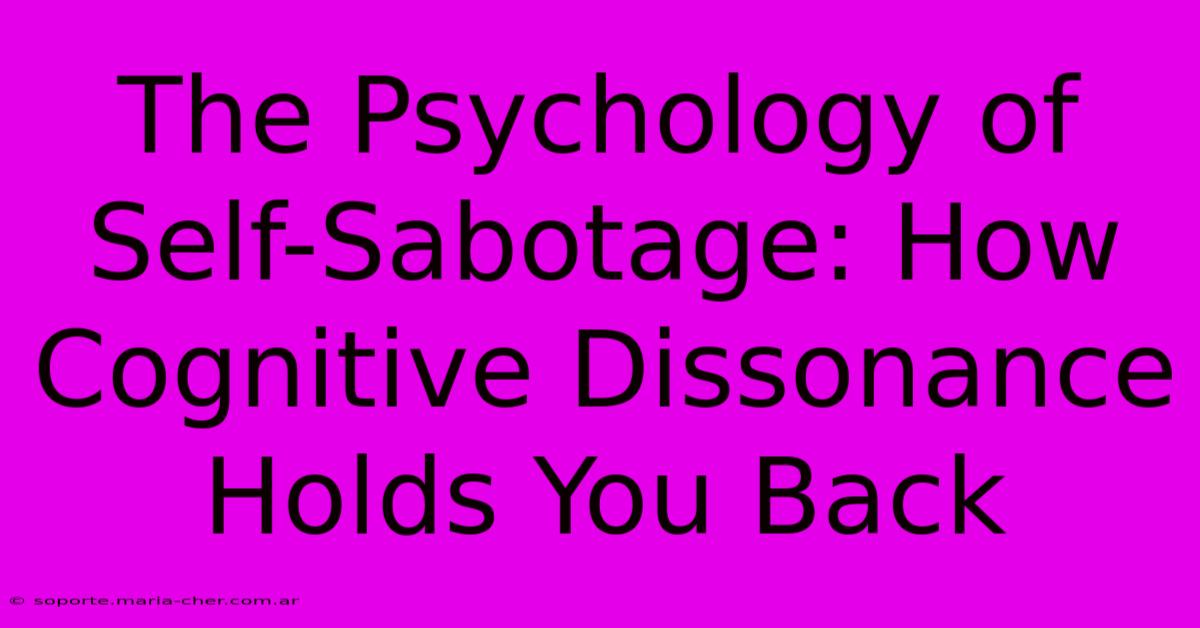The Psychology Of Self-Sabotage: How Cognitive Dissonance Holds You Back

Table of Contents
The Psychology of Self-Sabotage: How Cognitive Dissonance Holds You Back
We all know that feeling: you're striving for a goal, working hard, yet somehow, you find yourself consistently undermining your own efforts. This isn't laziness; it's self-sabotage, a complex psychological phenomenon rooted in cognitive dissonance. Understanding this connection is crucial to breaking free from this cycle and achieving your full potential. This article delves into the psychology behind self-sabotage, exploring how cognitive dissonance fuels this behavior and offering practical strategies to overcome it.
What is Self-Sabotage?
Self-sabotage is any behavior that hinders your progress towards a desired goal. It manifests in various ways, from procrastination and perfectionism to impulsive decisions and negative self-talk. While seemingly irrational, self-sabotaging behaviors often stem from deep-seated psychological needs and unresolved conflicts. It's a defense mechanism, albeit a self-destructive one.
Common Examples of Self-Sabotage:
- Procrastination: Putting off tasks until the last minute, increasing stress and reducing the quality of work.
- Perfectionism: Setting unrealistically high standards, leading to paralysis and avoidance of starting projects.
- Negative Self-Talk: Engaging in self-criticism and doubt, undermining confidence and motivation.
- Impulsive Decisions: Making rash choices that contradict long-term goals, leading to setbacks and frustration.
- Relationship Sabotage: Pushing away supportive partners or friends who might help you achieve your goals.
The Role of Cognitive Dissonance
Cognitive dissonance is the mental discomfort experienced when holding two or more conflicting beliefs, ideas, or values. This discomfort motivates us to reduce the dissonance, often through rationalization or self-justification. Self-sabotage often arises when our actions contradict our self-image or deeply held beliefs.
For example, someone who believes they are inherently unworthy might subconsciously sabotage their career success, believing they don't deserve it. The dissonance between their desire for success and their belief in their unworthiness is resolved by self-sabotage; failing provides "evidence" supporting their negative self-image.
How Cognitive Dissonance Drives Self-Sabotage:
- Protecting Self-Esteem: Self-sabotage can be a way to protect self-esteem by preventing failure in a high-stakes situation. Failing a small task might feel less painful than risking failure on a larger, more meaningful goal.
- Avoiding Responsibility: Self-sabotage can be a way to avoid taking responsibility for success. If you fail, you can blame external factors, avoiding the potential discomfort of acknowledging your own capabilities.
- Maintaining the Status Quo: Significant life changes can be daunting. Self-sabotage can help maintain a familiar, albeit unsatisfactory, status quo, avoiding the uncertainty and potential risks associated with growth.
Breaking Free from the Cycle of Self-Sabotage
Overcoming self-sabotage requires self-awareness, mindful behavior, and consistent effort. Here are some strategies to help you break free:
1. Identify Your Self-Sabotaging Behaviors:
Start by honestly examining your patterns of behavior. Are you consistently procrastinating? Engaging in negative self-talk? Identify the specific behaviors that hold you back. Keeping a journal can be incredibly helpful in this process.
2. Understand the Underlying Beliefs:
Once you've identified your self-sabotaging behaviors, explore the underlying beliefs that fuel them. What fears, insecurities, or limiting beliefs are contributing to this behavior? Therapy or self-reflection exercises can be valuable tools here.
3. Challenge Your Negative Thoughts:
Negative self-talk is a significant contributor to self-sabotage. Challenge those negative thoughts by questioning their validity and replacing them with more positive and realistic affirmations.
4. Set Realistic Goals and Expectations:
Setting unrealistic goals can lead to feelings of overwhelm and frustration, fueling self-sabotage. Break down large goals into smaller, manageable steps, celebrating each accomplishment along the way.
5. Practice Self-Compassion:
Treat yourself with kindness and understanding. Recognize that everyone makes mistakes and experiences setbacks. Focus on learning from your experiences rather than dwelling on failures.
6. Seek Professional Help:
If you are struggling to overcome self-sabotage on your own, consider seeking professional help from a therapist or counselor. They can provide guidance and support to help you address the underlying psychological issues contributing to your self-sabotaging behavior.
Conclusion
Self-sabotage is a complex issue, but understanding its psychological roots—particularly the role of cognitive dissonance—is the first step toward overcoming it. By identifying your self-sabotaging behaviors, challenging your negative thoughts, and practicing self-compassion, you can break free from this cycle and achieve the success you deserve. Remember, the journey to self-improvement is ongoing, and seeking support when needed is a sign of strength, not weakness.

Thank you for visiting our website wich cover about The Psychology Of Self-Sabotage: How Cognitive Dissonance Holds You Back. We hope the information provided has been useful to you. Feel free to contact us if you have any questions or need further assistance. See you next time and dont miss to bookmark.
Featured Posts
-
Showcase Your Construction Expertise The Ultimate Guide To Unforgettable Business Cards
Feb 07, 2025
-
The Secret To Reducing Epidural Injection Costs Dont Get Fooled Again
Feb 07, 2025
-
Shocking Truth Revealed Are Your Favorite Brands Deceiving You With Ad Fallacies
Feb 07, 2025
-
Pain Relief Revolution Epidural Injections For The Budget Conscious
Feb 07, 2025
-
Prepare For A Royal Affair Your Invitation To The Exclusive Disney Movie Court
Feb 07, 2025
